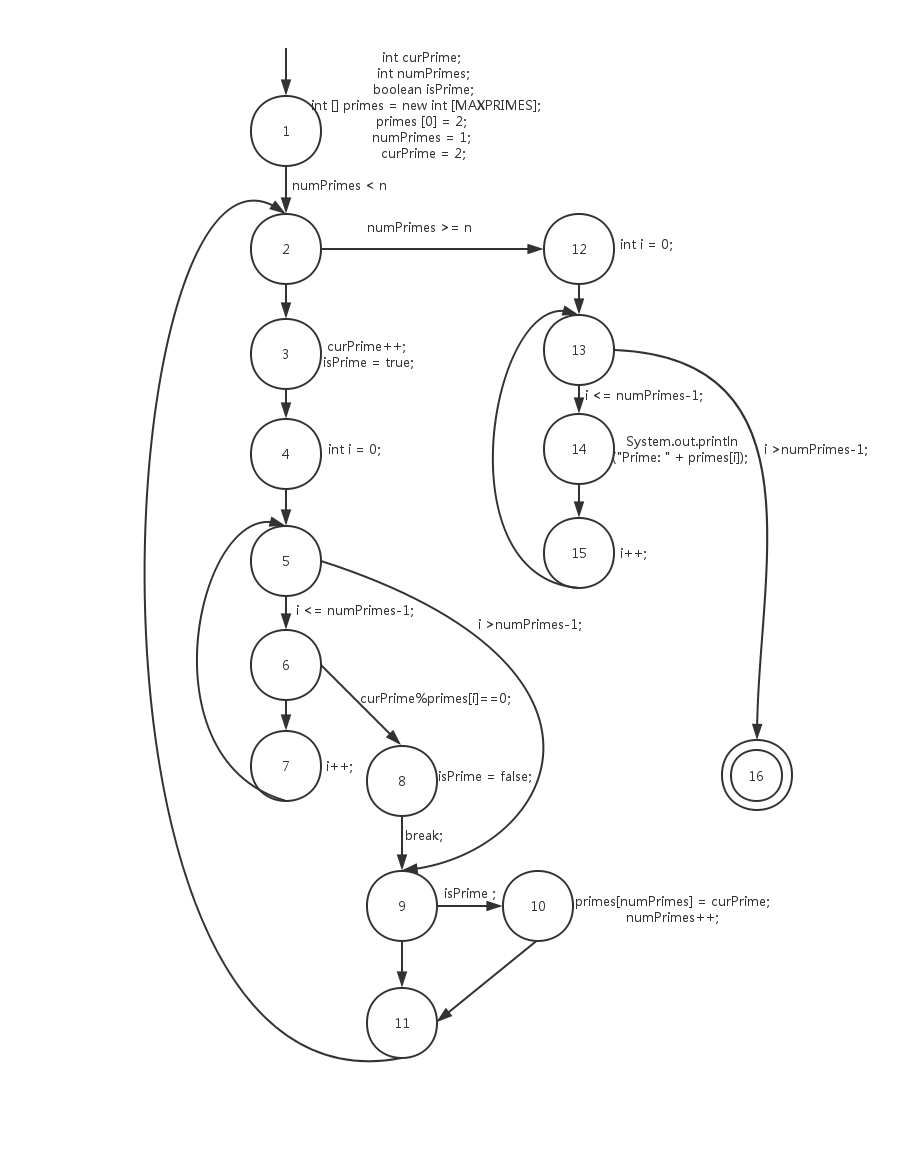软件测试学习(4)
public static void printPrimes (int n) { int curPrime; // Value currently considered for primeness int numPrimes; // Number of primes found so far. boolean isPrime; // Is curPrime prime? int [] primes = new int [MAXPRIMES]; // The list of prime numbers. // Initialize 2 into the list of primes. primes [0] = 2; numPrimes = 1; curPrime = 2; while (numPrimes < n) { curPrime++; // next number to consider ... isPrime = true; for (int i = 0; i <= numPrimes-1; i++) { // for each previous prime. if (curPrime%primes[i]==0) { // Found a divisor, curPrime is not prime. isPrime = false; break; // out of loop through primes. } } if (isPrime) { // save it! primes[numPrimes] = curPrime; numPrimes++; } } // End while // Print all the primes out. for (int i = 0; i <= numPrimes-1; i++) { System.out.println ("Prime: " + primes[i]); } } // end printPrimes
a)画出数据流图。

b)测试用例t1=(n=3)和t2=(n=5),设计一个t2能发现但是t1不能发现的错误。
数组越界问题。
c)找到一个不经过while循环的测试用例。
n=1;
d)找出点覆盖、边覆盖和主路径覆盖的所有测试需求。
点覆盖:{1,2,3,4,5,6,7,8,9,10,11,12,13,14,15,16}
边覆盖:{(1,2),(2,3),(3,4),(4,5),(5,6),(5,9),(6,7),(6,8),(7,5),(8,9),(9,10),(9,11),(10,11),(11,2),(2,12),(12,13),(13,14),(13,16),(14,15),(15,13)}
主路径覆盖:
{(1,2,3,4,5,6,7),(1,2,3,4,5,6,8,9,11),(1,2,3,4,5,6,8,9,10,11),(1,2,3,4,5,9,11),(1,2,3,4,5,9,10,11),(1,2,12,13,16),(1,2,12,13,14,15),
(2,3,4,5,9,11,2),(2,3,4,5,9,10,11,2),(2,3,4,5,6,8,9,11,2),(2,3,4,5,6,8,9,10,11,2),
(3,4,5,9,11,2,3),(3,4,5,9,10,11,2,3),(3,4,5,6,8,9,11,2,3),(3,4,5,6,8,9,10,11,2,3),(3,4,5,9,11,2,12,13,16),(3,4,5,9,11,2,12,13,14,15),(3,4,5,9,10,11,2,12,13,16),(3,4,5,9,10,11,2,12,13,14,15),(3,4,5,6,8,9,11,2,12,13,16),(3,4,5,6,8,9,11,2,13,14,15),(3,4,5,6,8,9,10,11,2,12,13,16),(3,4,5,6,8,9,10,11,2,12,13,14,15),
(4,5,9,11,2,3,4),(4,5,9,10,11,2,3,4),(4,5,6,8,9,11,2,3,4),(4,5,6,8,9,10,11,2,3,4),
(5,6,7,5),(5,9,11,2,3,4,5),(5,9,10,11,2,3,4,5),(5,6,8,9,11,2,3,4,5),(5,6,8,9,10,11,2,3,4,5),
(6,7,5,6),(6,8,9,11,2,3,4,5,6),(6,8,9,10,11,2,3,4,5,6),(6,7,5,9,11,2,12,13,16),(6,7,5,9,11,2,12,13,14,15),(6,7,5,9,10,11,2,12,13,16),(6,7,5,9,10,11,2,12,13,14,15),(6,7,5,9,11,2,3,4,5,6),(6,7,5,9,10,11,2,3,4,5,6),
(7,5,6,7),(7,5,6,8,9,11,2,3,4),(7,5,6,8,9,10,11,2,3,4),(7,5,6,8,9,11,2,12,13,16),(7,5,6,8,9,11,2,12,13,14,15),(7,5,6,8,9,10,11,2,12,13,16),(7,5,6,8,9,10,11,2,12,13,14,15),
(8,9,11,2,3,4,5,6,8),(8,9,10,11,2,3,4,5,6,8),(8,9,11,2,3,4,5,6,7),(8,9,10,11,2,3,4,5,6,7),
(9,11,2,3,4,5,9),(9,10,11,2,3,4,5,9),(9,11,2,3,4,5,6,8,9),(9,10,11,2,3,4,5,6,8,9),
(10,11,2,3,4,5,9,10),(10,11,2,3,4,5,6,8,9,10),
(11,2,3,4,5,9,11),(11,2,3,4,5,9,10,11),(11,2,3,4,5,6,8,9,11),(11,2,3,4,5,6,8,9,10,11)
(13,14,15,13),
(14,15,13,14),(14,15,13,16),
(15,13,14,15)}
Junit进行主路径覆盖测试
public class Statistics { /** * * @param numbers * @return the length of the array */ public int calLength(int[] numbers) { int length = numbers.length; return length; } /** * * @param numbers * @return the mean value of the array */ public double calMean(int[] numbers) { int length = calLength(numbers); double sum; sum = 0.0; for (int i = 0; i < length; i++) { sum += numbers[i]; } double mean = sum / (double) length; return mean; } /** * * @param numbers * @return the var value of the array */ public double calVar(int[] numbers) { int length = calLength(numbers); double mean = calMean(numbers); double varsum = 0.0; for (int i = 0; i < length; i++) { varsum = varsum + ((numbers[i] - mean) * (numbers[i] - mean)); } double var = varsum / (length - 1.0); return var; } }
import static org.junit.Assert.*; import org.junit.Before; import org.junit.Test; public class StatisticsTest { private Statistics statistics; @Before public void setUp() throws Exception { statistics = new Statistics(); } @Test public void test() { //fail("Not yet implemented"); int a[] = {1,1,1,1,1,1} ; assertEquals(0.0,statistics.calVar(a),0.0001); } }


